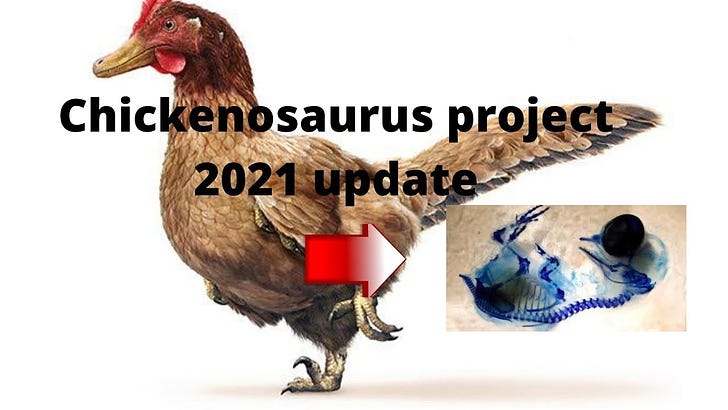Original Blog Entry from 2013
Submitting a grant application (even a little one like the funding for this podcast) is a relief, not quite like that first breath after blowing your nose, but kind of. I did the final update two whole hours before the deadline, on a day when I had a cold and a temporary crown put on one of my teeth.
Sitting in that chair with nothing to do but bite down, while the various putties and molds were drying, got me to thinking about the evolution of teeth (It was a lot better than watching the infomercials -- Chuck Norris's Total Gym, Cindy Crawford's superoxide dismutase anti-aging skin cream, derived from rare French melons). We have a lot of biology majors who are interested in dental school, and there was a dentist who studied pain (what else) in my neuroscience cohort, but otherwise I know very little about them. My one research experience was guiding a senior project on dental abscesses, surprisingly common infections of the tooth roots that can turn into brain infections by decaying their way through upper jaw the skull, which is pretty thin at those spots. So I did a quick search and found this review article by a trio of Greeks. I don’t speak Greek, but I do speak scientific or medical English (a.k.a. technobabble), which is derived mostly from Greek and Latin. It's that basic education, that vocabulary, that allows me to efficiently absorb new information about things I've never studied. The lack of that basic vocabulary is a huge barrier to beginning students like the ones I teach.
In the episode I mention genetic engineering to give us more teeth, but there are in-between procedures, like stem-cell transplants and manipulations of developmental proteins, that don’t have to involve rewriting gene sequences, just turning genes on and off, like Jack Horner wants to do to create chickenosaurus. Translating from the article’s geekspeak, it may be more promising (and a hell of a lot easier) to use stem cells to clone and grow new teeth and implant them surgically, or to trigger individual teeth to form under the gums, than to rewrite the genome to automatically grow new ones as old ones wear out the way sharks do.
(It would also remove all the ethical questions inherent in choosing the form of your children’s bodies for them before they’re even born, but that's another conversation.)
I also offhandedly mentioned that I don’t have any wisdom teeth. They weren’t cut out; they never formed at all. My dad only had two. I had never heard of this before, but apparently it’s really common. According to Wikipedia, between 9-30% of the population are missing at least one, which removes my one credible claim to Homo superiority, and the lamest superpower mutation ever.
I don’t know if anyone else will find this as hilarious as I did (or just stupid), but I recorded the episode before my dental anesthetic wore off. Despite the sound, my tongue was not actually swollen at all. I know this because I was looking in the bathroom mirror at my house the whole time. Lidocaine blocks the sodium channels along the axons of your nerves and prevents them from transmitting the electrical pain signals up to your brain. Exactly how that leads to the feeling of enlargement I’m not entirely sure. It may related to phantom limb syndrome, where missing input causes the brain to crank up its sensitivity, trying to re-establish the circuit. The motor nerves still worked fine, because my dentist put the shot right into the trigeminal nerve root at the back of my jaw, avoiding the motor nerve axons, which run through a different path (at least I think that’s why).
The funniest part of the whole thing to me was how the effect came and went with concentration. If I slowed down enough I could do still say S and R and L. It was worst when I was trying to say words with lots of syllables. Was I replacing the somatosensory feedback with sound feedback by listening to my own speech? That would be the reverse of deaf people, who still have tongue sensation and full motor control, but who sound a little strange to us because they can’t hear their own voices to accomplish the fine-tuning.
Updates from 2023
The latest update I could find on the chickenosaurus project was from 2022. They’ve discovered that while some dinosaur genes have only been turned off, others have been lost entirely and will have to be moved in from another species.
Lidocaine does lots of things, many of which I’d never heard of:
pain relief;
regulating heart rhythm;
reducing inflammation;
and maybe even treating the lung damage from COVID.
The anti-inflammatory stuff happens at lower doses than those necessary to block sodium channels, and almost a hundred years of use indicates a low potential for dangerous side effects. That’s really interesting.
The best book I’ve read on teeth recently is only tangentially about teeth. James Nestor’s Breath: the New Science of a Lost Art has a chapter on how soft foods prevent the chewing exercise our jaws need to grow to their full size, leading to the crowding endemic in industrial humans, but almost completely absent in earlier cultures. The same lack of bone growth in the skull above the jaw constricts the nasal passages, leading to poor breathing, snoring, and eventually sleep apnea.
Being a mutant, I did not have this problem, but my kid just spent about $3000 having four wisdom teeth cut out. The pain and swelling lasted for days, which it now seems might have been reduced by a longer, lower dose of the same lidocaine that opened the procedure.










Share this post